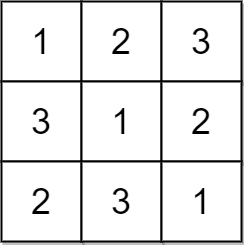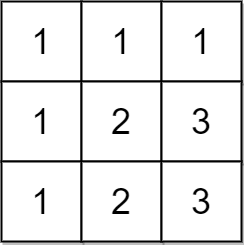Problem
An n x n matrix is valid if every row and every column contains all the integers from 1 to n (inclusive).
Given an n x n integer matrix matrix, return true **if the matrix is **valid. Otherwise, return false.
Example 1:

Input: matrix = [[1,2,3],[3,1,2],[2,3,1]]
Output: true
Explanation: In this case, n = 3, and every row and column contains the numbers 1, 2, and 3.
Hence, we return true.
Example 2:

Input: matrix = [[1,1,1],[1,2,3],[1,2,3]]
Output: false
Explanation: In this case, n = 3, but the first row and the first column do not contain the numbers 2 or 3.
Hence, we return false.
Constraints:
n == matrix.length == matrix[i].length1 <= n <= 1001 <= matrix[i][j] <= n
Solution (Java)
class Solution {
public boolean checkValid(int[][] matrix) {
int n = matrix.length;
Set<Integer> set = new HashSet<>();
for (int[] ints : matrix) {
for (int anInt : ints) {
set.add(anInt);
}
if (set.size() != n) {
return false;
}
set.clear();
}
for (int i = 0; i < matrix[0].length; i++) {
for (int[] ints : matrix) {
set.add(ints[i]);
}
if (set.size() != n) {
return false;
}
set.clear();
}
return true;
}
}
Explain:
nope.
Complexity:
- Time complexity : O(n).
- Space complexity : O(n).